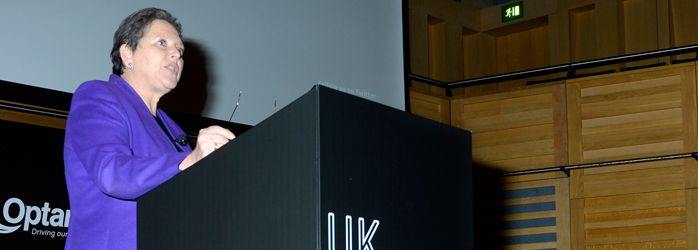
REPORT ON INAUGURAL SUMMIT
FEBRUARY 2015
OVERVIEW
The bus industry has not seen an event like the UK Bus Summit for over 15 years. The conference brought together over 300 delegates, a cross-section of industry leaders from bus operators, councils, PTEs and combined authorities, local enterprise partnerships, and lobby groups. There was a lot to talk about and a number of potentially controversial themes.
But there was also a considerable amount of common ground – on questions such as the importance of buses to the economy and to local communities, enthusiasm for new technology including smart ticketing and greener buses, and on the need to make the passenger the central focus of all efforts.
The day was divided into four themes – The vision for buses; Why buses matter; How technology can create efficiency; and How should buses be delivered.
The significance of the event is reflected in the fact that Transport Secretary Patrick McLoughlin gave the opening address, and transport minister Baroness Kramer the closing one.
Here we present a summary of the sessions: whatever the subject, the discussions were never less than stimulating.
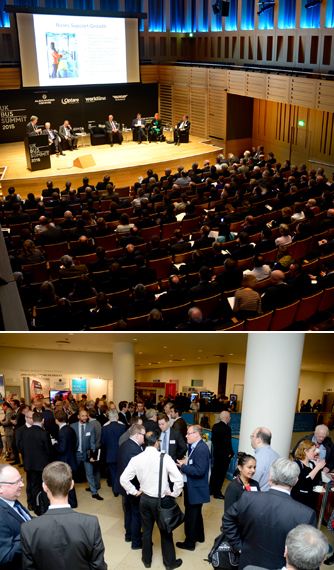
Panel members
Derek Mackay MSP, Scottish Transport Minister
Danny Kennedy MLA, Northern Ireland Transport Minister
Leon Daniels, Managing Director, Surface Transport, TfL
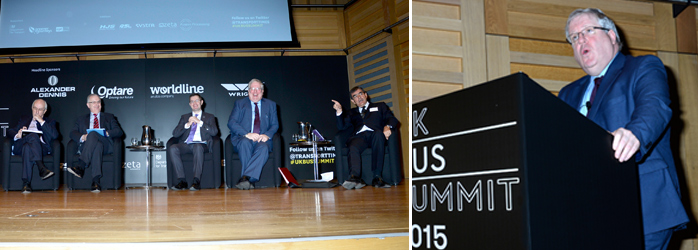
Transport secretary Patrick McLoughlin said: "We all agree buses are key to helping people get around. But we need buses that are modern, clean, reliable and easy to use."
Four elements had a part to play in achieving this. First the Government, which had allocated more than £300m for major bus projects in this parliament, £70m through the Better Bus Areas programme and £600m through the Local Sustainable Transport Fund.
Second, the private sector. "I back a strong, commercial bus market," he said. "Bus operators innovate because they are commercial businesses competing against other forms of transport and other operators."
Third, cities. Bus services are the most local form of public transport and decisions should be taken locally. The momentum for devolution was growing, notably in Greater Manchester. But local enterprise partnerships also had a pivotal role. "If we want buses to thrive we need to make sure LEPs are getting the message."
Fourth, technology – in the form of clean buses, and smartcards integrated across all modes of transport. "Multi-mode, multi-operator smart ticketing does not always get the priority it should," he said.
There were great prospects for the industry, he concluded. "By putting the passenger at the heart, and working together in partnership; by grasping the opportunities provided by devolution; innovating and harnessing technology; and by meeting local challenges with the right local solutions, I've no doubt those great prospects will be realised."
Scottish transport minister Derek Mackay said: "The mixed model of market-driven services, regulated and supported by a mixture of central and local funding, is not fundamentally broken. But there are challenges which better bus services could help us address – in environmental quality, economic development and combating exclusion and inequality."
His aspiration was to bring about modal shift to public transport and active travel. "We will work with local authorities and LEPs as appropriate," he said. He expressed disappointment that "we haven't seen more quality partnerships in Scotland". The government was looking at the operation of the Local Transport Act in England "to see what more can be done" and doing further work on franchising and quality contracts, which require ministerial approval in Scotland. The Bus Investment Fund would be reviewed and improved; and there would be a drive to push forward smart and integrated ticketing, working with rail, ferry, bus and other transport providers. "We will be pushing the integrated transport agenda very hard," he said.
Northern Ireland transport and regional development minister Danny Kennedy said: "Much work still needs to be done to achieve modal shift." In the province, integrated transport operator Translink would be seeking to "streamline" Metro services in Belfast and build on the success of flagship Goldine express coach services outside the city. It aimed to introduce a single smartcard for all modes of transport. A bus rapid transport network under construction in Belfast will feature high quality buses, real time information, and off-bus ticketing to speed boarding and is expected to attract three million additional journeys annually. Interchange between modes would be improved, for example by connecting cycle routes to transport hubs such as bus stations. "This will be a major step forward in integration," he said.
Leon Daniels, Transport for London managing director for surface transport, said a number of special conditions prevailed in the capital to make the regulated bus market a success. One was the congestion charge. "Rigorous attention to detail" was needed on a daily basis to operate the service at the highest level possible. Fares had to remain affordable, requiring a balance to be struck between farepayers' and taxpayers' contributions. This required "strong political leadership".
In the next 15 years TfL would seek to put "more information in the hands of users" to help make the services "something you can inherently rely on". Zero emission vehicles were about to appear and future challenges would include big changes such as autonomous vehicles.
He warned that technology could be disruptive in unexpected ways. A large-scale online system to match "every journey with available vehicles in a sort of global car share" was "only one step beyond Über". This was a revolution for which the technology already existed; the industry needed to be alert for developments such as this which "could overtake us," he said.
Panel members
David Martin, Chief Executive, Arriva
Claire Haigh, Chief Executive, Greener Journeys
Robert Hough, Chair, Liverpool City Region LEP
Alex Pratt, Chair, The LEP Network and Buckinghamshire Thames Valley LEP
Mike Blackburn, Chair, Manchester LEP
John Henkel, Acting Director of Transport, West Yorkshire Combined Authority
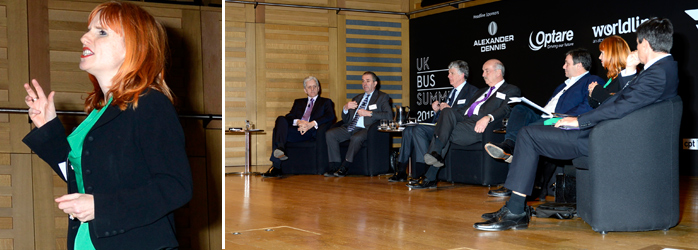
The second session focused on the importance of bus services to thriving local economies.
Greener Journeys chief executive Claire Haigh summarised the body of evidence the organisation has assembled in recent years to quantify the benefits of bus services to economic growth, improving the environment and reducing congestion.
More people commute to work on buses than any other form of public transport, creating economic output worth £64bn; shopping and leisure trips made by bus passengers amount to £27bn annually. Bus priority measures generate £3.32 in benefits for every £1 spent. Greener Journeys' evidence helped safeguard bus service operators' grant in the last spending review.
But now, she said, "the industry must work harder than ever to speak with one voice and make the case for the bus". With scarce public funding, and much transport capital funding devolved to local enterprise partnerships, "transport will need to compete for capital investment with training, housing and so on", she said.
Unlike rail and now road there was no strategic plan to invest in infrastructure to benefit buses. "This is why we need a National Statement on local bus infrastructure," she said. This would provide guidance to local decision-makers on the benefits of bus services. Growth deal awards would be linked to LEPs' strategic economic plans which would have a supporting Local Transport Plan.
Alex Pratt, chair of the LEP Network, said local enterprise partnerships were established as a means to the end of creating economic growth. Transport was one of the factors in creating places where firms could grow. The 39 LEPs had published their strategic economic plans and had set about prioritising elements within them. "The DfT has more readily embraced the concept of LEPs," he said, "so quite a lot of the proposals relate to transport." Between the LEPs there was a problem of integrating their aims and priorities. "It would make perfect sense if there was a National Statement to guide LEPs, because we have to find a better way of integrating between them."
LEPs accepted the importance of transport and buses. But because of the focus on economic growth, "the case [for funding] has to be made on economic grounds". To engage more effectively with their LEPs, bus supporters in any area "needed to say the same thing in a coherent manner".
Arriva chief executive David Martin said: "How to create flourishing public transport networks? For me it can be summed up in one word: partnership."
But there needed to be clear rules. "Stakeholders have to stick to their commitments, such as delivering bus lanes and maintaining them for the duration of the agreement."
Liverpool, where most of the city's bus lanes had been removed, illustrated the point. Bus services had been slowed down as a result. "We'd invested in buses on the basis of investment in the bus lanes. On top of that we're now having to put more buses on to make up for longer journeys. It's this sort of thing that can lead to the breakdown of relationships."
He added: "I'm not an advocate of a regulatory approach. We will work with what we have in place. If it's not broken was can deliver and built on that." UK operators, he said, "are not dug into trenches. There's a lot of fertile ground and a huge willingness to work in partnership."
Robert Hough, chair of Liverpool City Region LEP, asked how the industry could appeal to new customers, particularly in the business sector. Some groups did not use buses partly because of a lack of awareness about how the networks work. Apps and real time information were helpful, as was wi-fi on buses. "The economic and social benefits are one of the unappreciated factors of the bus network," he said.
John Henkel, West Yorkshire Combined Authority acting director of transport said that to maximise the bus's economic contribution required effective services and networks, remembering that some employment opportunities required interchange; availability, with services matching working hours; affordability; easy accessibility with understandable information about services and fares; and the ability to serve new growth areas before demand is fully realised.
Manchester LEP chair Mike Blackburn told the conference that in the city, "over the last decade public transport has played an integral role in creating the conditions for growth."
The flexibility of buses gave them a key role in serving areas of development or regeneration. He added that "better services outside core daytime hours can stimulate the night time economy and make the city a better place to live and work".
Panel members
Mark Nodder, Chairman & Chief Executive, Wrights Group
Robert Montgomery, Managing Director – UK Bus, Stagecoach
Rob Denton, Head of Client Innovation & Customer Experience, Wordline by Atos
Andy Eastlake, Managing Director, LowCVP
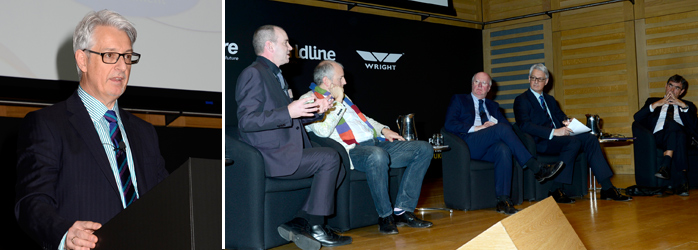
Mark Nodder, chairman and chief executive of Wrights Group, said technology was affecting bus design in a number of areas.
Weight has been reduced: "Our current buses are several tons lighter than their predecessors," he said. This has been achieved through a combination of more efficient structural design and the use of lighter materials such as aluminium and composites. "Every ton saves 6% of fuel," he said.
Regarding fuel and environmental efficiency, new microhybrid technology recaptures braking energy to power ancillaries such as power steering and the compressor. This cuts fuel consumption by 10%. Flywheel hybrids can save 15-20% of fuel. Full diesel-electric hybrids save 30%; plug-in and range-extended hybrids increase this to 40 and 60%. Fully electric and fuel cell buses produce zero emissions. However fuel cells are still many years from commercial viability, he said.
For fully electric buses, single deckers may have a large battery pack and be charged overnight, but for double deckers the battery pack becomes too heavy. Opportunity charging while in service is preferable. "We think that's the way ahead for double decks," said Mr Nodder.
All these technologies come at a price; payback periods range from 0.8 years for a microhybrid to eight for a full diesel-electric hybrid. Regarding electric buses, Mr Nodder said the key question was "Where is all the electricity going to come from?" A thousand double deckers undergoing rapid charging at the same time would require 400MW, the output of Enfield power station.
Last November the big five bus operators announced a commitment to introduce multi-operator smart ticketing in English cities. Stagecoach UK Bus managing director Robert Montgomery said the proposal was based "on work that has been going on for the last few years". It would be built on operators' existing smart systems rather than designing a bespoke new system. The plans cover all nine major city regions, would be competitively priced, would cost local authorities/PTEs nothing, and would be introduced by December this year. The scheme would initially be multi-operator but not multi-modal. "Once it's introduced we can add trains, ferries and trams," he said.
Rob Denton, Worldline head of client innovation and customer experience, said: "My job is to obsess about the passenger." Customers are wedded to convenience, things that make life easier, he said. "Customers want buses to be reliable, safe, secure, and value for money." They are also "impatient – they want things now".
He said: "Wi-fi is something I'd expect on my bus today", but though this was the case in the UK, on the European mainland this was not a priority for passengers. Innovation, he said, is "not necessarily about inventing something new but comes about through small changes."
Low CVP managing director Andy Eastlake said "The bus industry is a success in the low-carbon vehicle market." Buses for the UK markets have their performance assessed and measured very comprehensively, encompassing all global warming gases as well as NOx and particle emissions, all assessed on a whole-life, "well to wheel" basis.
The success was founded on active collaboration between manufacturers, operators and local authorities, facilitated by a framework of incentives, "among the most advanced in the world", put in place by the DfT. "The UK bus sector has embraced new technology more than any of the other sectors of the market," he said.
He added that of the range of technology from hybrids to biofuel to full electric, "no one technology is a panacea. We need a range of technologies available." Diesel would still have a place for many years to come. New Euro VI diesel buses will have lower NOx emissions than a van in 2017, he said.
Panel members:
Jon Lamonte, Chief Executive, Transport for Greater Manchester
Giles Fearnley, Managing Director – UK Bus, FirstGroup
Anthony Vigor, Director of Policy and External Affairs, National Express Group
David Brown, Chief Executive, Go-Ahead
Jonathan Bray, Director, Passenger Transport Executive Group
Tobyn Hughes, Managing Director, North East Combined Authority
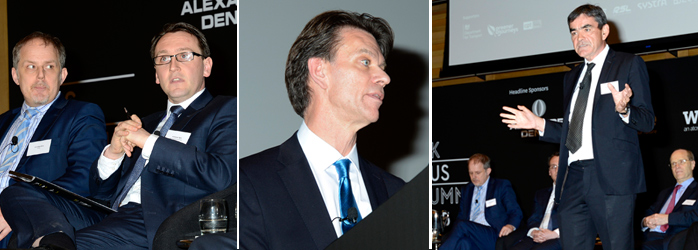
The final session addressed the potentially most controversial issue of partnerships versus a regulated, franchise based model.
Manchester plans to introduce franchising as part of its devolution deal. TfGM chief executive Jon Lamonte said that the transport authority did not think about the problem in regulation/deregulation terms but "in terms of economic goals".
Manchester sought a bus network fully integrated with tram and rail, easy to understand, with good quality buses, real time information, and simple ticketing. The city had global aspirations. "Fantastic things" had been achieved in the bus market through partnership, but "to get to another level we need to do more. The answer for us is franchising."
FirstGroup UK Bus managing director Giles Fearnley described improvements to services that had been brought about in a collaborative way around the country. In West Yorkshire, he said. "We believe in network stability, coverage and penetration as much as the [West Yorkshire combined] authority."
The quality partnership in South Yorkshire had "much more potential – we're talking about building on the current partnership". In Bristol, the local authorities' bus rapid transit proposals "gave us the confidence to invest", he said.
"I vote for partnership," he concluded. "It has worked for customers and transport authorities and allows improvements to be delivered rapidly."
Anthony Vigor, National Express director of policy and external affairs, said the company was "proud of its partnership with Centro. We believe it's delivering for passengers and addressing many concerns." A mature relationship has replaced an antagonistic one. "It has allowed us to deliver better services and outcomes to passengers." The partnership provided "a platform to discuss changes." Soon the National Express and Centro teams were to move into a joint office. "We are running more services and carrying more passengers, " he said. "There is an opportunity to build on this."
PTEG director Jonathan Bray said "in future the bus market is not going to be one thing or the other – not one size fits all." While local government was not going to move en masse to a franchised model, "serious players in the transport sector see potential benefits and opportunities in franchising".
He added: "Combined authorities and PTEs have a track record of delivering complex projects. Franchising gives authorities more of a stake in the success of bus services. We are moving towards a mixed economy in the way services are provided. It's not a future that can be shouted down or wished away."
Go-Ahead Group chief executive David Brown said that it was important to remember that "franchising can produce rubbish services". He borrowed Brighton & Hove Bus Company veteran Roger French's analogy that creating a good bus service is like baking a cake. "London's cake has been baking for 25 years and there have been some mistakes along the way." He added: "My belief, especially in tough times, is that bus operators require flexibility, and we need regulatory transport authorities not bogged down by the minutiae of running services."
The North East Combined Authority is already going through the approval process for a quality contract scheme. NECA managing director for transport operations Tobyn Hughes said that, having done the research over a number of years, the authority had concluded that "quality contracts will work for the North East".
He accepted that operators "have tried their best to come up with alternatives" and that the route the authority had taken was "challenging". But he added: "If everything was rosy in the garden we wouldn't be here." He challenged operators, who oppose the plans: "Are you going to portray us in the media as left-wing loonies, or are you going to accept that there are opportunities and work with us?"
Closing the conference, transport minister Baroness Kramer said: "One thing we can all agree on is that our aim should be to get the best deal for passengers."
She continued: "The bus sector is evolving. Progress on smart ticketing in the last few months has been remarkable. We're looking at new ways of providing the services that communities need. And the industry is showing new resolve in adopting new technology.
"But the test stays the same. Are passengers getting a good deal, and could it be improved? I believe there's more that could be done. So in 2015, I'll be looking to the bus sector to lead the way."
